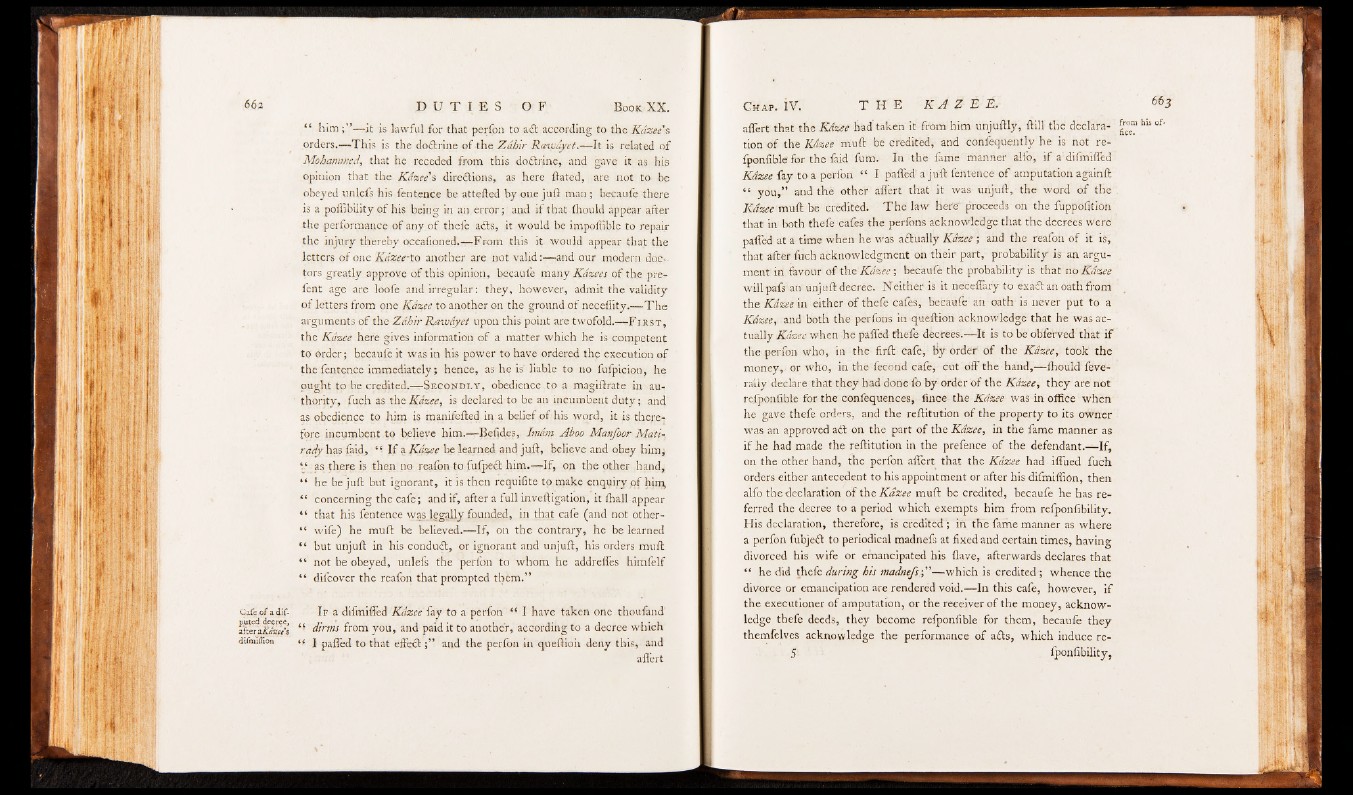
“ him — it is lawful for that perfon to ad according to the Razee's
orders.— This is the dodrine of the. Zdhir Rawdyet.— It is related of
Mohammed, that he receded from this dodrine,. and gave it as his
opinion that the Razee's diredions, as here ftated, are not to be
obeyed -unlefs his fentence be attefted by one jufl man; becaufe there
is a poffibility of his being in an. error; and if that Ihould appear after
the performance of any of thefe ads, it would be impoffible to repair
the injury thereby occafioned.— From this it would appear that the
letters of one Razee-to another are not val idrand our modern doctors,
greatly approve of this opinion, becaufe many Razees of the pre-
fent age are loofe and irregular: they, however, admit the validity
of letters from one Rdzee to another on the ground of neceflity.— The
arguments of the Zdhir Rawdyet upon this point are twofold.— F i r s t ,
the Rdzee here gives information of a matter which he is competent
to order; becaufe it was in his power to have ordered thp execution of
the fentence immediately; hence, as he is'liable to no fufpicion, he
ought to be credited,— S e c o n d l y , obedience .to a magiftrate in authority,
fuch as the Rdzee, is declared to be an incumbent dutyand
as obedience to him is manifefted in a belief ..of his word, it is there-r
fore incumbent to believe him.— Befides,. Imam Aboo Manfoor Mati^
rady has laid, “ If a Rdzee be learned and juft, believe and obey him;
M as there is then no reafon to fufpedt him.— If, on the other hand,
“ he be juft but ignorant, it is then requifite to make enquiry jof him,
“ concerning the cafe; and if, after a full inveftigation, it fhall-appear
“ that his fentence was_leg|lly founded, in that cafe (and not other-
“ wife) he mull: be believed.— If, oh the contrary, he be learned
“ but unjuft in his condud, or ignorant and unjuft, his orders muft
“ not be obeyed, unlefs the perfon to whom he addrelles himfelf
“ difcover the reafon that prompted them.”
Cafe o f a disputed
decree,
after aKazee’s
difmiifion
If a difmilled Rdzee fay to a perfon “ I have taken one thoufand'
“ dirms from you, and paid it to another, according to a decree which
“ 1 palled to that effed;” and the perfon in queftioh deny this, and
affert
affert that the Rdzee had taken it from him unjuftly, ftill the declaration
of the Razee muft be credited; and confequently he is not re-
fponfible' for the faid fum. In the fame manner alfo, if adifmiffed
Rdzee fay to a perfon “ I palled1 a juft; fentence of amputation againft
“ you,” and the other aflert that it was unjuft, the word of the
Razee muft be credited. The law hete^ proceeds on the fuppofition
that in both thefe cafes the perfons acknowledge that the decrees w'ere
palled at a time when he was adually Rdzee ; and the reafon'of it is,
that after fuch acknowledgment on their part, probability is an argument
in favour of the Rdzee; becaufe tlie probability is that no Rdzee
will pafs an unjuft decree. Neither is it necefiary to exad an oath from
the Rdzee in either of thefe cafes, becaufe an oath is never put to a
Razee, and both the perfons in queftion acknowledge that he was actually
Rdzee when he palled thefe decrees,— It is to be obferved that i f
the- perfon who, in the firft cafe, By order1 of the Rdzee, took' the
money,- or who, in the feeohd cafe, cut off the hand,— Ihould'feve-
raily declare that they had done fo by order o f the Rdzee, they are not
refp.onlible for the confequences, fince the Rdzee was in office when
he gave thefe orders, and the reftitution of the property to its owner
was an approved aft on the part of the Rdzee, in the fame manner as
if he had made the reftitution in the prefence of the defendant.— If,
on the other hand, the perfon affert that the Rdzee had iffued fuch
orders either antecedent to his appointment or after his difmiffion, then
alfo the declaration of the Rdzee muft be credited, becaufe he has referred
the decree to a period which exempts him from refponlibility.
His declaration, therefore, is credited ; in the fame manner as where
a perfon fubjed to periodical madnefs at fixed and certain times, having
divorced his wife or emancipated his Have, afterwards declares that
“ he did thefe during his madnefs;”— which is credited'; whence the
divorce or emancipation are rendered void.— In this cafe, however, if
the executioner of amputation, or the receiver of the money, acknowledge
thefe deeds, they become refponfible for them, becaufe they
themfelves acknowledge the performance of ads, which induce re-
5 , fponfibility,